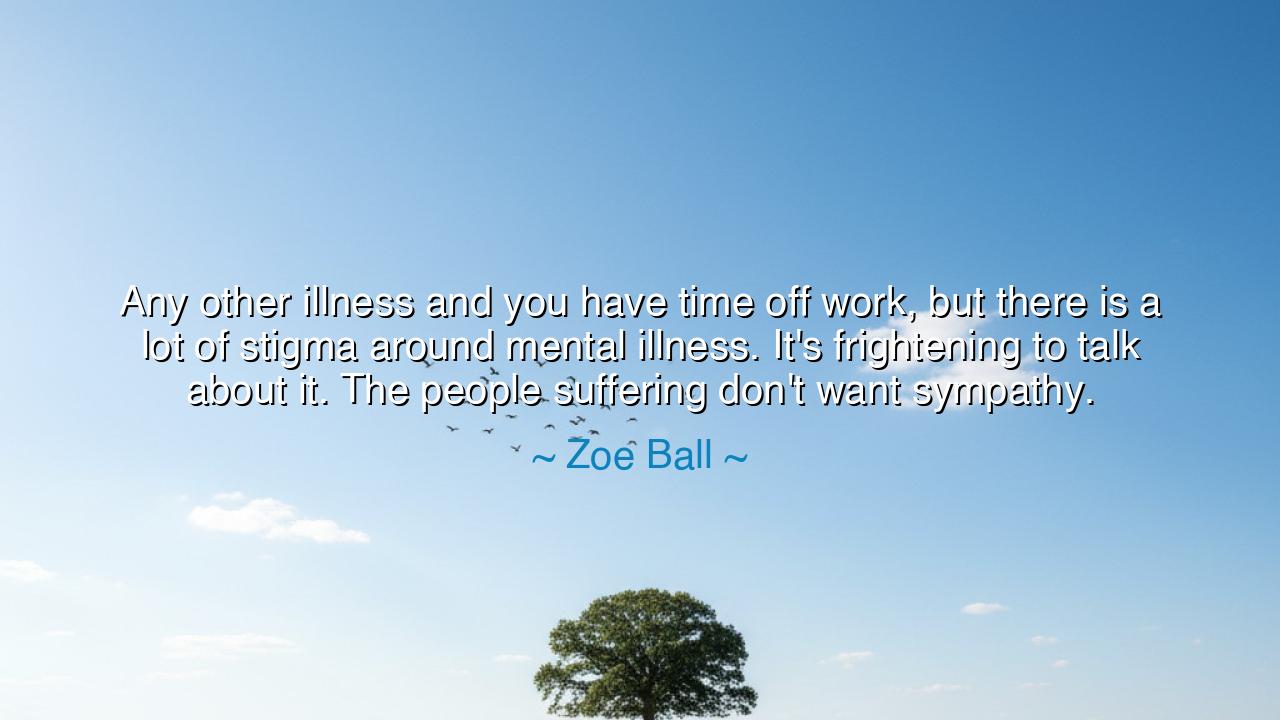
Any other illness and you have time off work, but there is a lot
Any other illness and you have time off work, but there is a lot of stigma around mental illness. It's frightening to talk about it. The people suffering don't want sympathy.






Hear now the solemn words of Zoe Ball, who spoke with the clarity of one who has walked among shadows: “Any other illness and you have time off work, but there is a lot of stigma around mental illness. It's frightening to talk about it. The people suffering don't want sympathy.” In this utterance lies a truth both ancient and urgent: that the wounds of the mind are often hidden, dismissed, or shamed, though they weigh upon the soul as heavily as broken bones or fevered flesh. For when the body falters, society gives rest and care; but when the mind trembles, silence and suspicion often follow.
From the dawn of civilization, humankind has feared what it cannot see. The warriors of old bore scars upon their skin, and such marks became badges of honor. Yet when scars lie hidden within the unseen chambers of the mind, they are mistaken for weakness rather than the battle wounds they truly are. This is the cruel paradox Zoe Ball calls forth: that one may be granted compassion for a visible sickness, but for mental illness, one receives isolation, whispers, or denial. Thus, those who suffer are doubly burdened—by the weight of their struggle and by the chains of stigma.
Consider the tale of Vincent van Gogh, the painter whose canvases burned with colors no one had dared imagine before him. His spirit was tormented by storms of the mind, yet in his agony he brought forth beauty that still illuminates the world. In life, he was scorned, mocked, even pitied—but rarely understood. He received no time of healing, no honor for his unseen battles. Only in death was his genius revered. His story is a testament to the truth Zoe Ball proclaims: that suffering minds ask not for pity, but for dignity, understanding, and the right to be treated as whole beings.
The fright Zoe speaks of—the terror of confessing one's struggle—arises not from the illness itself but from the fear of society’s gaze. How many remain silent, laboring under invisible burdens, because they dread being cast aside, marked as fragile or unfit? Thus, they wear masks, smiling while their hearts fracture, until the silence becomes unbearable. The ancients taught that to name a thing is to take away some of its power; yet here, the naming of mental illness is feared, because it may bring not healing but judgment.
But let the wisdom of time speak: every soul bears its winters. Just as fields must rest after harvest, so must minds sometimes falter and seek renewal. To deny this truth is to deny our own humanity. The lesson that flows from Zoe Ball’s words is clear—compassion must not be selective, reserved only for the wounds of flesh. It must extend equally to the wounds of spirit. For those who suffer seek not sympathy, which can belittle, but recognition, respect, and the space to heal without shame.
Practical wisdom is thus laid before us: speak gently when others confess their struggles, for the courage to speak is itself heroic. Do not mock nor dismiss, but listen, for listening is a form of healing. Grant rest to those whose minds falter, as you would to one struck by fever or pain. And for yourself, should shadows fall upon your spirit, do not hide in silence—seek the hand of a friend, a healer, or a community that knows the worth of your soul.
Let it be remembered: to care for the mind is as sacred as caring for the body. To shatter the chains of stigma is to honor the truth that every being is fragile, and every being is worthy. So may future generations rise wiser than we, creating a world where no one fears to say, “I am unwell,” and where no one must hide their suffering in the darkness. For in such truth, humanity shall find its greatest strength.






AAdministratorAdministrator
Welcome, honored guests. Please leave a comment, we will respond soon